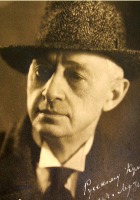Ivan Bunin Biography
Ivan Alekseyevich Bunin (22 October 1870 – 8 November 1953) was the first Russian writer to win the Nobel Prize for Literature. He was noted for the strict artistry with which he carried on the classical Russian traditions in the writing of prose and poetry. The texture of his poems and stories, sometimes referred to as "Bunin brocade", is considered to be one of the richest in the language.
Best known for his short novels The Village (1910) and Dry Valley (1912), his autobiographical novel The Life of Arseniev (1933, 1939), the book of short stories Dark Avenues (1946) and his 1917–1918 diary (Cursed Days, 1926), Bunin was a revered figure among anti-communist White emigres, European critics, and many of his fellow writers, who viewed him as a true heir to the tradition of realism in Russian literature established by Tolstoy and Chekhov.
The rain and the wind and the murk
Reign over cold desert of fall,
Here, life's interrupted till spring;
Till the spring, gardens barren and tall.
...
November. Midnight damp. Chalk-white beneath
The moon the village lies, by the oppressive
Hush overcome. The tide sweeps in, impassive,
Its voice all deep solemnity and breadth.
...
A crackling fire. Light, heat in the felucca.
Pikes in the water. Pearl-white sand below.
The trident now! You'll get one if you're lucky.
Go slow, don't rush. A blow! Another blow!
...
Blasting the malachites beneath the rudder,
The seething sea spews pearly blobs of foam.
The shore sails nearer as we move from under
The ship's smooth, towering shape and make for home.
...
'Who knocks? I won't get up. I will not open
The spray-soaked door of this old hut. How chill
And how uneasy are the nights of autumn!
And yet its dawns are more uneasy still.'
...
